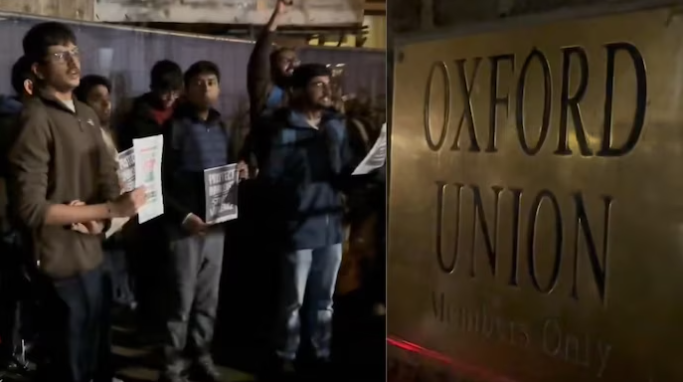Indian Students Oxford Union, a prestigious debating society, has often been a platform for discussions on sensitive and controversial issues. However, its recent debate on Kashmir sparked protests among Indian students who felt that the event was biased and failed to represent the complexities of the region. The protest reflects the broader tensions surrounding the Kashmir issue and raises questions about the responsibilities of global institutions in addressing such topics.
Overview of the Oxford Union’s Kashmir Debate
The Debate Theme
The debate centered on the political and human rights situation in Jammu and Kashmir, with particular emphasis on the question of self-determination. While intended to foster intellectual discussion, the event drew criticism for allegedly presenting a one-sided narrative.
The Participants
The panel included scholars, activists, and political commentators, some of whom are known for their controversial positions on Kashmir. Indian students alleged that the panel lacked voices from mainstream Indian perspectives or representatives from the Union Territory of Jammu and Kashmir.
The Student Protests: A Timeline For the more information click on this link
For the more information click on this link
Pre-Debate Opposition
Indian student groups at Oxford raised concerns about the debate as soon as it was announced. They argued that the format and choice of speakers hinted at an anti-India bias, prompting calls for the inclusion of diverse voices to ensure a balanced discussion.
Day of the Protest
On the day of the debate, students gathered outside the venue, holding placards and chanting slogans. Messages such as “Kashmir is an integral part of India” and “Stop the biased narrative” underscored their grievances.
Post-Debate Reactions
After the event, many students expressed their dissatisfaction with the debate’s proceedings, stating that it lacked factual accuracy and perpetuated misinformation. Social media became a battleground for discussions, with supporters and detractors of the protest weighing in.
The Key Concerns of Indian Students
Alleged Bias in Narrative
Protesters claimed that the debate disproportionately focused on allegations against India while ignoring the impact of cross-border terrorism and the voices of Kashmiri citizens who support Indian sovereignty.
Lack of Diverse Representation
The exclusion of voices from Indian government officials, scholars supportive of India’s position, or local Kashmiri representatives was a major point of contention. Students argued that this undermined the debate’s credibility.
Sensitivity of the Issue
For Indian students, the Kashmir issue is not just a geopolitical matter but also a deeply emotional one, tied to national identity and sovereignty. They felt that the debate trivialized the sacrifices of Indian security forces and civilians affected by terrorism in the region.
Broader Context of the Kashmir Issue
Historical Background
Kashmir has been a contentious issue between India and Pakistan since the Partition of 1947. The region has witnessed wars, insurgency, and political upheaval, making it one of the most militarized zones in the world.
Recent Developments
India’s abrogation of Article 370 in August 2019, which granted special status to Jammu and Kashmir, further polarized opinions. While India views this move as an integration of the region, critics, Indian Students including Pakistan, have called it a violation of Kashmiri autonomy.
International Perspectives
International forums and organizations often address the Kashmir issue, but the narrative varies widely. India maintains that it is an internal matter, Indian Students while Pakistan and some advocacy groups push for international intervention.
Academic Institutions and Their Role in Geopolitical Debates
The Responsibility of Neutrality
Institutions like the Oxford Union have a responsibility to provide balanced and fact-based discussions, Indian Students especially on issues as complex as Kashmir. Failure to do so can lead to accusations of bias and damage their credibility.
The Impact of Misinformation
Misrepresentation of facts in academic debates can perpetuate stereotypes and hinder constructive dialogue. The Kashmir debate, according to protesters, Indian Students exemplified this problem.
Reactions to the Protest
Support for the Protesters
Several Indian diaspora groups, academics, and political leaders expressed solidarity with the protesting students. They commended their efforts to challenge perceived biases and defend India’s stance.
Criticism of the Protests
On the other hand, some accused the protesters of stifling free speech and academic discourse. They argued that protests should not prevent debates, even on contentious topics.
Social Media Storm
The protests ignited a fierce debate on social media, Indian Students with hashtags like #KashmirDebate and #IndiaAtOxford trending. The discussions highlighted the polarization surrounding the issue.
Implications of the Protest
For Indian Students Abroad
The protest demonstrated the Indian diaspora’s willingness to stand up for national interests, even in foreign academic settings. It also underscored the challenges they face in defending their perspectives on global platforms.
For the Oxford Union
The controversy may prompt the Oxford Union and similar institutions to reevaluate their approach to sensitive topics, ensuring inclusivity and factual accuracy in their events.  For the more information click on this link
For the more information click on this link
For the Kashmir Debate
The incident highlighted the need for more nuanced and balanced discussions on Kashmir, Indian Students both within and outside India. Simplistic narratives do little to address the region’s complex realities.
Conclusion
The protests by Indian students against the Oxford Union’s Kashmir debate reflect the deep emotions and political sensitivities surrounding the issue. While academic institutions have the right to foster debate, Indian Students they also bear the responsibility of ensuring that such discussions are balanced and grounded in facts.
For Indian students, the protest was not just about defending their country’s position but also about challenging what they saw as an unfair portrayal of a critical issue. As the global discourse on Kashmir continues, Indian Students such incidents underscore the importance of dialogue that is respectful, inclusive, and informed.
Call to Action
Stay informed about global debates and ensure that your understanding of sensitive issues is based on multiple perspectives. Support balanced discussions that seek to foster understanding and resolution, Indian Students rather than division and conflict. ALSO READ:-U.K. Scrambles Jets to Monitor Russian Aircraft Over North Sea 2024




